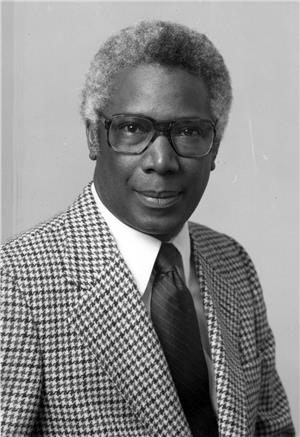Walter R. Hundley, minister, sociologist, civil rights worker, and administrator, served Seattle in a number of important offices including Superintendent of Parks and Recreation, Director of Management and Budget, Director of Central Area Motivation Project, and Director of the Seattle Model City Program. He retired from public service in 1988 and died in 2002 after a long illness.
Early Years
Walter Hundley was born in Philadelphia on March 8, 1929, to Wilma and Walter R. Hundley Jr. He was raised there in a 99 percent black neighborhood, which he recalls was pretty rough. "I am amazed that I have lived this long because getting out of Philly was a miracle. Shootings hadn't started but there were knife fights. I used to look at my all black junior high graduation picture and half of the boys were either dead or in jail."
After finishing West Philadelphia High School, which was only 10 percent black, he had planned to join the army, but fate stepped in and changed the course of his life. His minister, an influential man who recognized potential, went about seeking scholarship assistance for him.
Eventually he was awarded a scholarship at Lincoln University in Pennsylvania. He graduated in 1950, with an A.B. in English and Philosophy. It was during these college days that he became involved in civil rights. Because of the segregation in movies in the little town nearest the campus and the militancy of the returning soldiers, he and others formed an NAACP chapter on campus. "We did our shopping in the town but those buggers who were really dependent on us made us sit in the balcony at the movies." So began his efforts in integration.
Ministry
Mr. Hundley was raised in the Baptist Church and had always been religious, but never felt qualified to be a preacher because he couldn't "put on a performance." While at Lincoln, one of his professors gave him special courses and books to read and urged him to go to Yale Divinity School.
He did so. After finishing Yale in 1953, he came to Seattle in January 1954, as minister at the Church of the People, a liberal non-denominational church involved in many community activities such as a church affiliated student group, community forum, and a foreign student center.
Social Work
The church folded in 1956 and social work became his focus. After working briefly as a caseworker for the Washington State Department of Public Assistance, he went on to provide casework services to inmates at the Washington State Reformatory in Monroe in the late 1950s, becoming the first African American counselor to be hired there. He won election as president of the Monroe Local 452 of the Washington Federation of State Employees.
Then in 1960, he received a Bachelor of Social Work Degree from the University of British Columbia. Three years later he received a Master of Social Work Degree from the University of Washington and began work as a Group Worker and Research Investigator for the Seattle Atlantic Street Center to study the effectiveness of social work methods in preventing delinquent behavior in troubled junior high school boys.
Civil Rights
It was during the late sixties that he became a highly visible figure in the civil rights movement in Seattle. As chair of the Congress for Racial Equality and member of the Central Area Civil Rights Committee, he was a leader in organizing the boycott against Seattle Public Schools and in promoting picketing and marches through downtown for equal employment and housing opportunities.
In 1966, after federal funds became available through the Office of Economic Opportunity, he was asked to direct the Central Area Motivation Project, the largest community action program in King County. In 1968, he became director of the Seattle Model City Program which, under his supervision, served as a model for the rest of the country.
Seattle City Government
From 1974 until 1977, Mr. Hundley served as Director of Office of Management and Budget. This office functions in the Executive Department and is primarily concerned with monitoring the execution and preparation of the proposed budget for the city under the direction of the mayor. When Mayor Wes Uhlman (b. 1935) won victory over a ballot recall in 1975, he considered it a personal vindication for Hundley. Hundley had been branded in the formal recall charges filed by the Fire Fighters' Union as unqualified and incompetent in his administration of the management and budget office.
In 1977, he was appointed Superintendent of the Department of Parks and Recreation. In this position, which he held for 11 years, he tried to develop a model that would insure park maintenance within a certain number of man hours. He is responsible for the many flowers seen in a number of the parks in the system. After his retirement in 1988, he worked briefly as director of the Central Area Senior Center. He resigned because of ill health and died on June 6, 2002, after a long battle with kidney disease.
Awards
Recognizing Mr. Hundley's distinct contribution to the city, the Seattle Municipal League cited him as Outstanding Public Official in 1968-69. Other awards include:
- an award from Seattle Urban League in 1967;
- Social Worker of the Year from the Puget Sound Chapter, National Association of Social Workers in 1968;
- First Citizen from Pacific Northwest Chapter, Washington Section, American Institute of Planners in 1969;
- the Liberty Bell Award from the Seattle/King County Bar Association in 1970.

